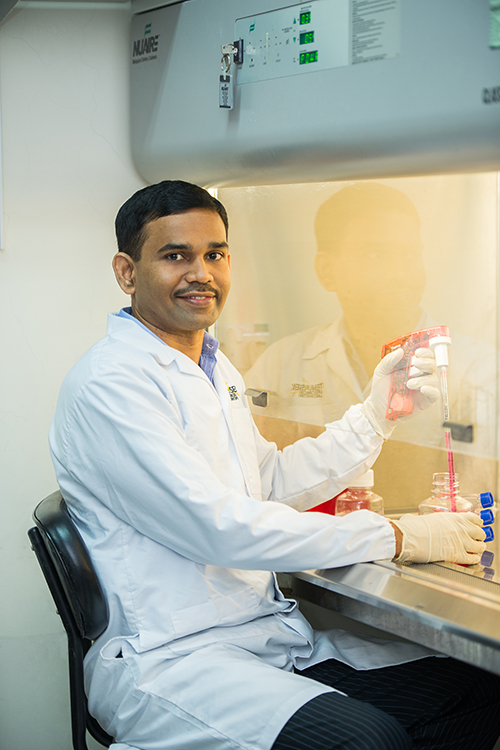
Impact
The research focuses on developing broadly protective novel vaccines and diagnostics for emerging infectious viruses, and addressing challenges such as preventing the emergence of antiviral drug resistance in highly mutating viruses like influenza and coronaviruses. By targeting host factors critical to viral replication rather than the viruses themselves, the lab explores new therapeutic strategies to combat these pathogens.
Collaborations, Achievements & Honours
- Licensed a novel pseudorabies vectored multivalent vaccine for major swine viral diseases to Beijing United Health
- Filed multiple patents in the United States for animal viral disease innovations.
- Received research grants from the Singapore Food Agency
- Published author in selected journals such as Journal of Virology, Frontiers in Immunology, Viruses, Vaccine, Antiviral Research and Reviews in Medical Virology
Research Areas
Virus-host interactions, Emerging viruses, Vaccines and Antiviral therapies, Aquatic animal health
Affiliations
- Principal Investigator, TLL
Question
How can understanding the molecular mechanisms of viral pathogenesis help us develop novel recombinant vaccines for emerging human and veterinary diseases, as well as design better therapeutics?
Approach
Prabakaran’s lab specializes in studying the molecular pathogenesis of emerging and zoonotic infectious viruses, designing new antiviral therapeutics, and developing recombinant multivalent vaccines for infectious viral diseases.
Past projects include studying the molecular pathogenesis of novel Cardioviruses using reverse engineering in a mouse infection model. The findings from this research is applicable to the study of highly prevalent but lesser-known viruses, contributing to the prevention and control of emerging novel viral diseases.
The lab has identified key neutralizing epitopes responsible for protective immunity, thereby broadening the cross-protective efficacy of vaccines against highly divergent Avian influenza A viruses. The findings suggest that epitope-modified, non-pathogenic H5 viruses antigenically related to HPAI-H5N1 can facilitate the development of broadly protective vaccines while reducing the need for Biosafety Level 3 (BSL3) containment facilities. The lab continues to investigate the interaction of respiratory viruses and to develop vaccines for economically important animal and human infectious diseases.
Concurrently, Prabakaran’s lab involves in developing oral and immersion vaccines for economically important viral diseases in aquaculture and also exploring strategies to enhance disease resilience in Barramundi and Shrimp. The team is working on discovering effective mucosal vaccines and point-of-care viral diagnostics to improve fish farm productivity. Notably, the lab was the first to identify and characterize immunoglobulin tau (IgT) in Asian Seabass, providing critical insights into IgT’s crucial role in defending mucosal tissues against viral pathogens.
Bio
Prabakaran received his Master of Philosophy degree in Biochemistry from the University of Madras. He subsequently worked in the Department of Animal Biotechnology at Tamil Nadu Veterinary and Animal Sciences University. He pursued his PhD in Immunology at Madurai Kamaraj University, under a bilateral programme with Hannover Veterinary School. After completing postdoctoral training, Prabakaran joined TLL as a postdoctoral fellow in 2007 and was promoted to Strategic Research Program Manager in 2011. Since April 2015, he has been serving as a Principal Investigator at TLL.
Principal Investigator
Mookkan Prabakaran
The lab focuses on investigating infectious virus-host interactions to advance the development of novel antiviral therapies and effective vaccines.
Current Vacancies
Group Publications
-
Unique Immune and Other Responses of Human Nasal Epithelial Cells Infected with H5N1 Avian Influenza Virus Compared to Seasonal Human Influenza A and B Viruses
Tan KS*, Liu J, Andiappan AK, Lew ZZR, He TT, Ong HH, Tay D, Aw ZQ, Yi B, Fauzi AM, Yogarajah T, Carmen LCP, Chu JJH, Chow VT, Prabakaran M*, Wang DY*.7 April 2025 -
Utilization of a monoclonal antibody targeting the functional P-domain of Nervous Necrosis virus (NNV) coat protein: Developing an Epitope-blocking ELISA to quantify viral neutralizing antibodies
Carmen LCP, Chan J, Lee SQ, Hong HY, Chee PX, Song Y, Yang D, Prabakaran M.15 March 2025 -
Identification and characterization of Immunoglobulin Tau (IgT) in Asian Seabass (Lates calcarifer) and mucosal immune response to Nervous necrosis virus
Chan J*, Carmen LCP*, Qi LS, Prabakaran M.20 February 2023 -
Vaccines against major poultry viral diseases: Strategies to improve the breadth and protective efficacy
Ravikumar R*, Chan J*, Prabakaran M.1 June 2022 -
Development and translation of a paper-based top readout vertical flow assay for SARS-CoV-2 surveillance
Jia H, Miller EA, Chan CC, Ng SY, Prabakaran M, Tao M, Cheong I, Lim SM, Chen MW, Gao X, Abirami R, McBee ME, Preiser PR, Sikes HD, Kongsuphol P.29 March 2022 -
Characterization of a broadly neutralizing monoclonal antibody against SARS-CoV-2 variants
Zakir TS, Meng T, Carmen LCP, Chu JJH, Lin RTP, Prabakaran M.24 January 2022 -
Sequence- and structure-specific probing of RNAs by short nucleobase-modified dsRNA-binding PNAs (dbPNAs) incorporating a fluorescent light-up uracil analog
Krishna MS, Toh DK, Meng Z, Ong AAL, Wang Z, Lu Y, Xia K, Prabakaran M, Chen G.16 April 2019

